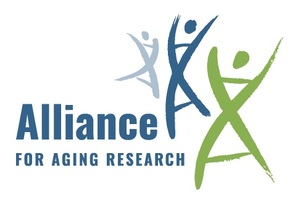WASHINGTON, Sept. 22, 2021 /PRNewswire/ -- Results from a new Morning Consult poll commissioned by the Alliance for Aging Research illustrate the priorities of older adults as Congress considers legislation to change the Medicare prescription drug benefit. The findings also show a key disconnect between direct negotiation policies under consideration and the public's understanding of the implications of these proposals. Nearly six in 10 (59%) seniors reported their understanding of government "direct negotiation" of Medicare prescription drug prices means "either the drug company or government proposes an initial price for a drug, then there is back-and-forth negotiation, and price ends somewhere in the middle." Only 16% view "direct negotiation" as the government setting prices for prescription drugs and refusing to cover them if the company does not agree.
"Older adults are past the point of pretense in life. They expect and deserve their members of Congress to be up front about proposals to address growing prescription drug out-of-pocket costs," said Sue Peschin, President and CEO of the Alliance for Aging Research. "The survey results show that seniors have real concerns about allowing the government to determine the value of their medicines, including how they will set the price and the potential for discrimination, fewer choices with reduced access, and stifled medical innovation. Older adults clearly support Congress passing legislation that would place a cap or limit on Medicare Part D out-of-pocket costs, so much so that more than half of Medicare beneficiaries are willing to pay a few extra dollars a month in Medicare premiums to help make it happen. If Congress and the Administration are serious about addressing Part D out-of-pocket drug costs, the ball is in their court."
The data reinforce that older adults are concerned when they learn more about Medicare negotiation:
- 76% are concerned that there is no guarantee that patients could save money as a result.
- 74% are concerned that which medications are covered could be decided based on the 'value' of a patients' life by looking at their medical conditions and age.
- 67% are concerned that government savings on prescription drugs could be used to pay for unrelated (non-healthcare) government spending.
While patients have concerns about the potential impact of potential legislation on access, they hope prescription drug pricing reform can achieve multiple aims:
- 90% said they would favor an annual cap on out-of-pocket costs for prescription drugs in Medicare.
- 89% favor greater transparency so that patients understand the percent of a drug's cost associated with middlemen and insurance companies.
- 86% favored basing the cost patients pay for drugs on the negotiated rate that insurers and employers pay, rather than the drug's list price.
Tradeoffs for Seniors in Prescription Drug Policy
The survey also asked respondents to consider two policy options and their preference between the two. The survey found:
- Nearly 6 in 10 respondents (57%) reported a willingness to pay a slightly higher monthly premium ($10 or less per month) to have lower deductibles and copayments. Only 15% reported a preference for a lower premium, with higher deductibles and copays.
- A plurality of respondents preferred to maintain access to a wide range of innovative prescription drugs, even if some had high prices, rather than keeping prescription drug costs as low as possible if it means fewer innovative and new drugs will be available.
Prescription Drugs in Medicare and the VA
More recently, policymakers have considered reforms to Medicare's prescription drug benefit that would align the benefit with the Veteran's Administration (VA) system. According to the survey, only 20% of seniors would trade their current coverage in favor of a system that resembles the VA. That's in part because only 36% believe that veterans receive high-quality health care and 29% think that veterans receive the most cutting-edge care and latest medications and treatments.
About the Survey
The nationwide survey of more than 1000 older Americans (60+) was conducted by Morning Consult from September 16-19, 2021. The interviews were conducted online, and the data were weighted to approximate a target sample of older adults (60+) on healthcare based on gender, educational attainment, race and region. Results from the full survey have a margin of error of plus or minus 3 percentage points.
About the Alliance for Aging Research
The Alliance for Aging Research is the leading nonprofit organization dedicated to accelerating the pace of scientific discoveries and their application to vastly improve the universal human experience of aging and health. The Alliance believes advances in research help people live longer, happier, more productive lives and reduce healthcare costs over the long term. For 35 years, the Alliance has guided efforts to substantially increase funding and focus for aging at the National Institutes of Health and Food and Drug Administration; built influential coalitions to guide groundbreaking regulatory improvements for age-related diseases; and created award-winning, high-impact educational materials to improve the health and well-being of older adults and their family caregivers. For more information, visit www.agingresearch.org
Media Contact:
Jim Bowers
[email protected]
(202) 463-7100
SOURCE Alliance for Aging Research

Related Links
WANT YOUR COMPANY'S NEWS FEATURED ON PRNEWSWIRE.COM?
Newsrooms &
Influencers
Digital Media
Outlets
Journalists
Opted In





Share this article